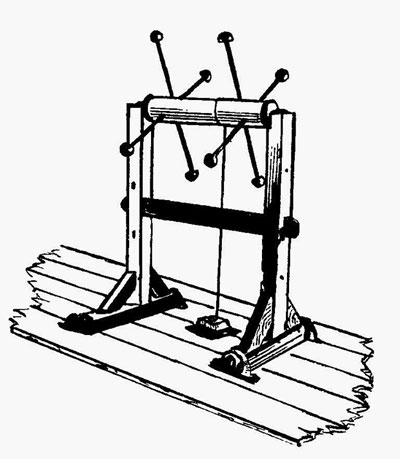Dumbbells, barbells, kettlebells: Why do we call weights 'bells'?
It dates back to a fitness craze of the 1700s


A free daily email with the biggest news stories of the day – and the best features from TheWeek.com
You are now subscribed
Your newsletter sign-up was successful
The various "bells" we see at the gym today — dumbbells, barbells, kettlebells — are inspired by actual bells, and not just metaphorically. Yes, they are made of heavy metal and can be swung like a bell, but they can also be traced back to a fitness craze of the 1700s involving an artificial church bell.
Have you ever tried to ring a giant medieval church bell? They are heavy! Ringing one not only requires general upper body strength, but also coordinated control of that strength. How does one develop that strength and control? Practicing on the bells for a few hours a day? Your village may not enjoy that. That’s why the dumb bell — a contraption that mimicked the weight and motion of bell ringing but produced no sound — was invented. It looked something like this:

There was apparently a more portable version of this apparatus, used for home exercise. The first citation for "dumb-bell" in the OED, from 1711, states: "I exercise myself an Hour every Morning upon a dumb Bell, that is placed in a corner of my room…My Landlady and her daughters…never come into my room to disturb me while I am ringing." When Ben Franklin mentioned the dumb bell in 1774 as a type of "compendious exercise" which he used to keep fit, it is unclear what sort of equipment he was referring to — it may have looked more like a hand-held bell without a clapper or a modern dumbbell. In any case, by the 19th century the dumbbell as we know it, looking very little like a bell, had become the standard. The names for the barbell and kettlebell, formed on analogy, came later.
The Week
Escape your echo chamber. Get the facts behind the news, plus analysis from multiple perspectives.

Sign up for The Week's Free Newsletters
From our morning news briefing to a weekly Good News Newsletter, get the best of The Week delivered directly to your inbox.
From our morning news briefing to a weekly Good News Newsletter, get the best of The Week delivered directly to your inbox.
Will the bell-ringing workout come back? In the past few years, the benefits of bell ringing have gotten some fresh attention. Not only are experts recommending an exercise called the Bell Tower Crunch, but you can try a bell ringing fitness class, or even buy your own old school dumbbell for home use. Quasimodo may have had a hunchback, but you can bet he also had some killer abs, pecs, and lats.
A free daily email with the biggest news stories of the day – and the best features from TheWeek.com
Arika Okrent is editor-at-large at TheWeek.com and a frequent contributor to Mental Floss. She is the author of In the Land of Invented Languages, a history of the attempt to build a better language. She holds a doctorate in linguistics and a first-level certification in Klingon. Follow her on Twitter.
-
 ‘Poor time management isn’t just an inconvenience’
‘Poor time management isn’t just an inconvenience’Instant Opinion Opinion, comment and editorials of the day
-
 Bad Bunny’s Super Bowl: A win for unity
Bad Bunny’s Super Bowl: A win for unityFeature The global superstar's halftime show was a celebration for everyone to enjoy
-
 Book reviews: ‘Bonfire of the Murdochs’ and ‘The Typewriter and the Guillotine’
Book reviews: ‘Bonfire of the Murdochs’ and ‘The Typewriter and the Guillotine’Feature New insights into the Murdoch family’s turmoil and a renowned journalist’s time in pre-World War II Paris
